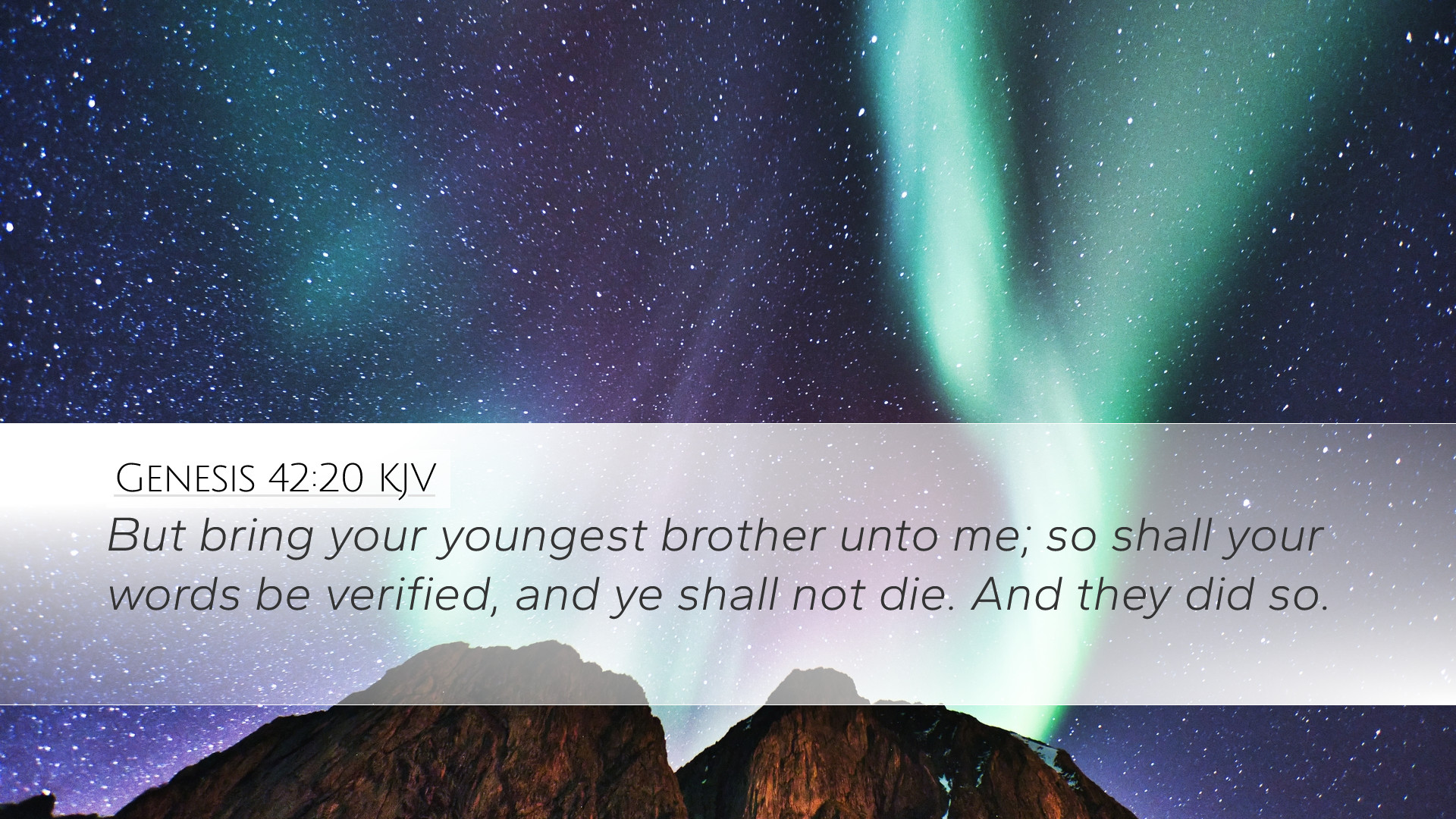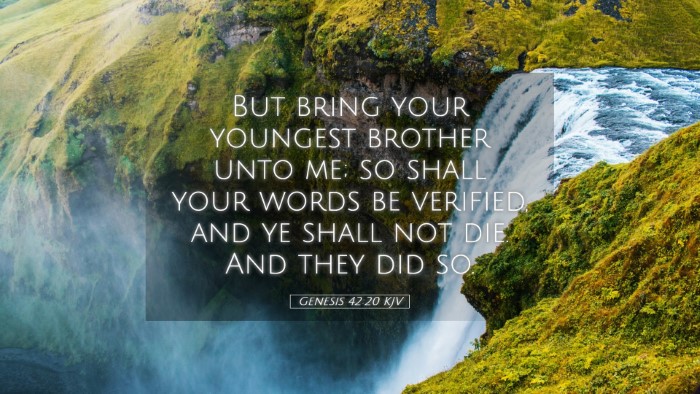Commentary on Genesis 42:20
Genesis 42:20 states, "But bring your youngest brother to me; so shall your words be verified, and you shall not die." And they did so. In this passage, we witness a pivotal moment in the narrative of Joseph and his brothers, emphasizing themes of testing, accountability, and the providence of God.
Contextual Overview
This verse is situated within the larger story of Joseph, who was sold into slavery by his brothers and later rose to power in Egypt. The arrival of his brothers in Egypt during a famine leads to a series of encounters that reveal the dynamics of their relationship and the extent of their remorse over past actions.
Insights from Public Domain Commentaries
Matthew Henry's Commentary
Matthew Henry draws attention to the gravity of the brothers' situation. They are faced with the consequences of their prior actions against Joseph, which add a layer of tension to their visit to Egypt. He notes that Joseph's demand for the youngest brother, Benjamin, serves to test their integrity as well as their guilt. Henry emphasizes:
- Guilt and Remorse: The brothers are confronted with the reality of their past sins against Joseph. Their hesitancy reflects a continuing sense of guilt.
- Divine Providence: Joseph’s actions are orchestrated by God’s sovereign plan, illustrating how God can turn evil intentions into a vehicle for good.
- Testing of Faith: Joseph's request for Benjamin tests their fidelity not just to him but also to their father, Jacob.
Albert Barnes' Notes
Barnes provides a meticulous examination of the implications behind Joseph's directive. He suggests that the act of bringing Benjamin was not merely a request but a necessary step in verifying the truth of their claims. Barnes highlights the following points:
- Verification of Truth: Joseph’s insistence on seeing Benjamin was a means to ascertain whether the brothers would be truthful. Their past deception concerning Joseph’s fate loomed large in this moment.
- Symbolism of the Youngest Brother: Benjamin represents innocence and the hope of the family’s restoration. His mention stirs emotions tied to familial bonds and the tragedy of their earlier actions.
- Confrontation with the Past: The brothers must confront their history not only with Joseph but also with their father, who remains in ignorance of much that has transpired.
Adam Clarke's Commentary
Adam Clarke elaborates on the narrative's structure and its moral implications. He underscores the profound moral lesson that unfolds through this interaction. Clarke emphasizes:
- Moral Responsibility: This passage illuminates the principle of accountability. Joseph’s position of authority serves as a reminder that one's actions are subject to divine judgment and scrutiny.
- Family Dynamics: The mention of bringing the younger brother evokes deep familial ties, emphasizing the complexity of brotherly relationships marked by jealousy and guilt.
- God’s Sovereign Intent: Clarke notes that God's guidance is often manifest in the trials that believers face, suggesting that Joseph’s tests are part of a divine redemptive plan.
Theological Implications
Genesis 42:20 offers rich theological implications, relevant for pastors and theologians:
- The Nature of Repentance: Genuine repentance involves recognizing and confronting past sins, a theme deeply ingrained in the narrative.
- Overcoming Fear: The brothers’ fear at the prospect of facing Joseph introduces a discussion on facing one’s fears in light of God’s grace.
- Restoration and Forgiveness: The movement toward reconciliation within a fractured family serves as a powerful metaphor for divine forgiveness and restoration.
Conclusion
Genesis 42:20 encapsulates a critical moment in Joseph’s story marked by tension, responsibility, and hope. By examining the insights gained from Matthew Henry, Albert Barnes, and Adam Clarke, we appreciate how this verse resonates with the themes of accountability and the search for forgiveness. It challenges readers to reflect on their own stories of guilt and redemption, reminding us that in facing our past, we may discover paths toward healing and reconciliation.


